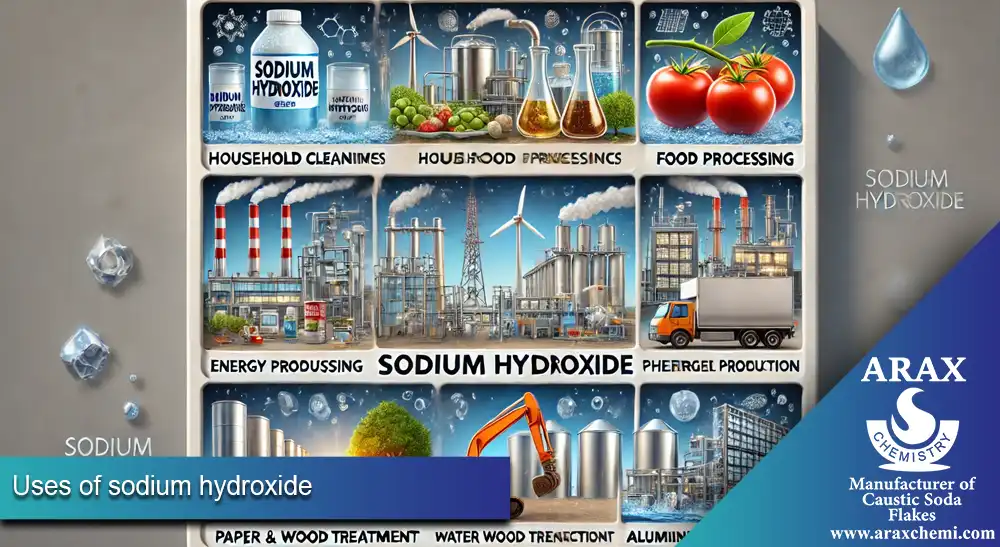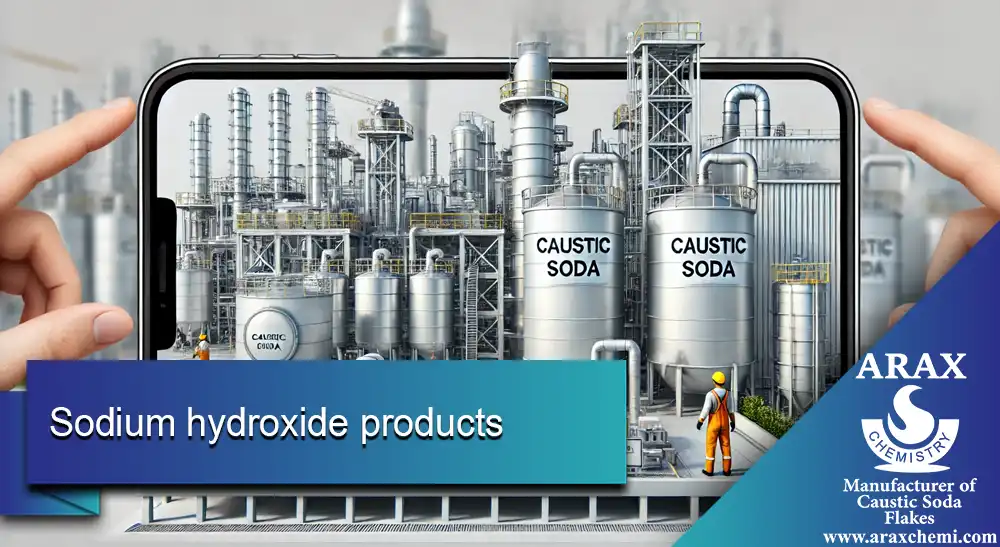Sodium hydroxide is one of the most widely used chemicals in industries, also known as caustic soda, lye, and sodium hydrate. This substance is an alkaline form of sodium oxide. In this section, we will explore the applications and products of sodium hydroxide in various fields. We will also examine the physical and chemical properties of this compound. Stay with Araks Chemical.
What is Sodium Hydroxide or Caustic Soda?
Sodium hydroxide is one of the most commonly used alkalines in industries. The chemical formula for sodium hydroxide is NaOH, indicating that it consists of one sodium atom or one hydroxide ion. Sodium is a highly reactive metal that burns upon contact with water, releasing significant heat. The price of caustic soda is typically determined by its purity level; the higher the purity percentage, the more effective it is. Caustic soda is available in solution, solid powder, granules, and pearl-like beads.
In everyday life, we encounter this substance in cleaning products and soaps. In industry, it is used to manufacture a variety of products.
Physical Properties of Sodium Hydroxide
- The purest form of sodium hydroxide is colorless and crystalline.
- The melting point of sodium hydroxide is 318 degrees Celsius, and its boiling point is 1388 degrees Celsius.
- Sodium hydroxide has high moisture-absorbing properties and is soluble in water, methanol, and ethanol.
Chemical Properties of Sodium Hydroxide
- It reacts vigorously with acids, forming salt and water.
- In reactions with glass, it produces soluble silicates, which is why it is stored in containers made from non-reactive materials.
- It reacts with other metal salts that are lower on the electrochemical series, such as iron, copper, etc.
Since the purity level of caustic soda plays a significant role in its reactivity and properties, when choosing a caustic soda manufacturer, attention should be paid to the brand name, purity percentage, and production standards.
Applications of Sodium Hydroxide Products
In this section, we will cover the most important uses and products of sodium hydroxide:

- Sodium Hydroxide in Cleaning and Disinfecting Products
- It is used to produce soaps and various cleaning chemicals utilized in households and industries. Bleach, one of the most common cleaning agents, is produced from a combination of chlorine and sodium hydroxide. Additionally, substances used to clear sewage blockages contain a high percentage of sodium hydroxide.
- Reaction of Sodium Hydroxide with Water and Copper Sulfate for Agricultural Uses
- When sodium sulfate, a strong base, reacts with copper sulfate (a salt), copper hydroxide precipitate forms, accompanied by sodium sulfate ions. Copper sulfate is used as a fungicide, algaecide, root killer, and herbicide in agriculture. This substance is also utilized as a drying agent in anhydrous form and as an additive for fertilizers and foods.
- Another application of copper hydroxide is in the aquarium industry due to its ability to eliminate external parasites in fish, including flukes, brook, and marine velvet, without harming beneficial fish. Additionally, this substance can be combined with latex paint to create a product for controlling root growth in potted plants.
- Sodium Hydroxide in Pharmaceuticals and Medicine
- The primary application of sodium hydroxide in the pharmaceutical and medical industries is the production of widely used medications. Sodium hydroxide is employed to manufacture various drugs and pharmaceutical products, including analgesics, aspirin, anticoagulant medications, and cholesterol-lowering drugs.
- Sodium Hydroxide in the Energy Industry
- Sodium hydroxide is used to manufacture cells or fuel cells. Fuel cells are known as clean energy sources, functioning similarly to batteries and providing necessary energy for various applications. Moreover, epoxy resins used in wind turbines are produced with sodium hydroxide.
- Sodium Hydroxide in Water Treatment
- Sodium hydroxide is used to control water acidity and facilitate the easier removal of heavy metals in municipal water treatment facilities. It is also utilized to produce sodium hypochlorite, a common water disinfectant.
- Sodium Hydroxide in Food Production
- Sodium hydroxide has numerous applications in food production. For instance, it is used in the processing and canning of olives, crisping pretzels, and removing the skins from tomatoes and other fruits for canning. Additionally, sodium hydroxide is employed to manufacture food preservatives and prevent the growth of fungi and bacteria.
- However, it is essential not to overlook the dangers of sodium hydroxide. Food-related industries have restrictions on the use of sodium hydroxide, and the amount of this substance in food should not exceed specified limits.
- Sodium Hydroxide in Wood and Paper Products
- In many paper production processes, the wood used is treated with a solution containing sodium hydroxide and sodium sulfide. This substance helps remove additional materials from wood. Sodium hydroxide is also used in the paper recycling process to separate ink from paper fibers.
- Additionally, sodium hydroxide solution is used for bleaching and cleaning wood used in wooden products.
- Sodium Hydroxide in Aluminum Ore Processing
- Sodium hydroxide is used to extract alumina from natural minerals. Alumina is employed in the production of aluminum and various aluminum products, such as kitchenware, cans, foils, barrels, and airplane parts. Furthermore, aluminum materials are used in construction to complete facades and window frames.
- Sodium Hydroxide in Other Manufacturing Uses
- Sodium hydroxide is utilized in numerous other industrial and manufacturing processes. For example, spandex, rayon, epoxy resins, glass, ceramics, and paints are produced with this substance. Additionally, it is used in the textile industry for color stabilization, processing cotton fabrics, and washing. In the metal-related industries, sodium hydroxide is used for metal processing, oxide coating, electroplating, and electrolytic extraction.
In this section, you can find a summary list of products in which sodium hydroxide plays a role in their production. The most important applications and products of sodium hydroxide include:
- Recycled rubber
- Stabilizers for latex rubber
- Industrial grease cutting
- Metal grease-removing products
- Gas treatment (gas scrubbing)
- Reconstituted resins
- Oil refining
- Galvanizing
- Graphic printing (etching)
- Fruit and vegetable peeling products
- Textile processing (cotton production)
- Cotton cleaners, dyeing
- Water treatment/disinfectants
- Vegetable oil refining
- Wastewater treatment products
- Propylene
- Chloro-hydrin
- Epoxy resin
- Vanillin
- Hydrazine
- Polycarbonate
- Chemical pulp
- Xylene sulfonic acid
- Cobalt hydroxide
- Aluminum ore
- Sodium stearate
- Sodium lauryl sulfate
- Sodium naphthenate
- Sodium oleate
- Sodium fluorostate
- Sodium formaldehyde sulfoxylate
- Sodium molybdate
- Sodium sulfite
- Monosodium glutamate
- Sodium propionate
- Sodium phenolate
- Sodium ortosilicate
- Sodium metasilicate
- Sodium picramate
- Sodium acetate
- Sodium chloroacetate
- Sodium cyanide
- Sodium format
Conclusion
If we look closely at our surroundings, we can quickly trace various sodium hydroxide products. This alkaline substance is consumed in various industries, and therefore, we should have a complete understanding of it. Some of the most important sodium hydroxide products include cleaning and disinfecting agents, various common medications, batteries, and more. If you intend to purchase caustic soda, it is advisable to obtain it from a reputable and well-known manufacturer. Araks Chemical, with decades of experience and a stellar reputation, has established itself among the top caustic soda manufacturers. For purchasing sodium hydroxide and inquiring about our product prices, feel free to contact our experienced professionals any day of the week with your questions.
Frequently Asked Questions
- What are the applications of sodium hydroxide?
Sodium hydroxide is a highly versatile substance used to produce various products such as paper, aluminum, sewage cleaners, ovens, soaps, and detergents. - What are the household uses of sodium hydroxide?
Most soaps and detergents are made from sodium salts of acids. Sodium hydroxide is also found in most cleaning products used at home. It is a key component of drain cleaners and oven cleaners. By dissolving a specific amount of sodium hydroxide in water, various impurities and stains can be removed from home environments. - What are the chemical properties of sodium hydroxide?
Sodium hydroxide reacts vigorously with acids, forming salt and water. This substance reacts with glass, leading to the formation of soluble silicates. This is why sodium hydroxide is stored in containers made from non-reactive materials. Sodium hydroxide also reacts with other metal salts positioned lower in the electrochemical series, such as copper, iron, etc. Furthermore, sodium hydroxide is used in saponification reactions.

